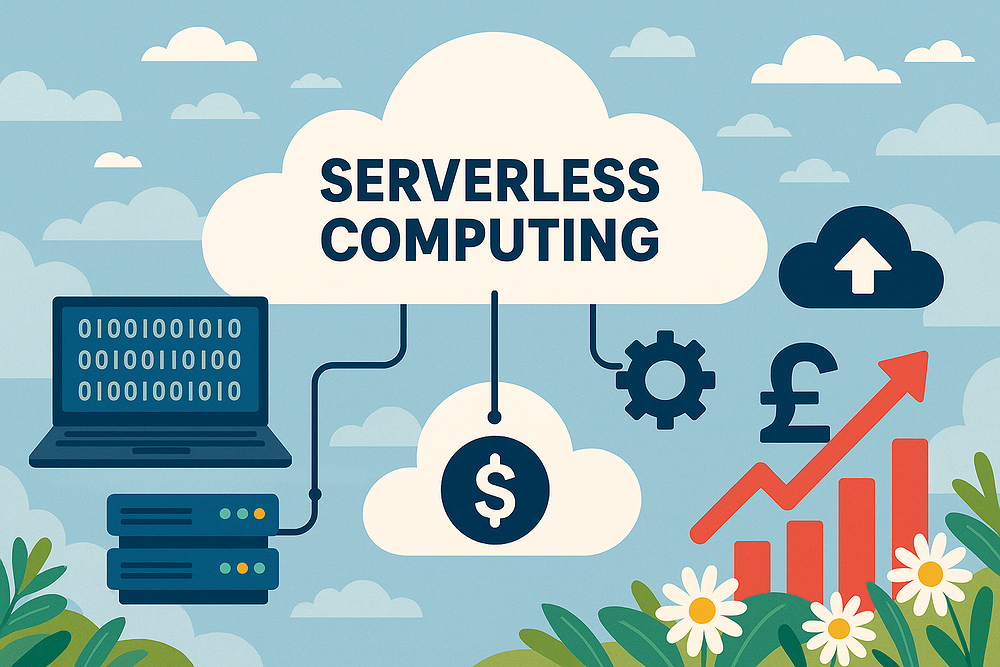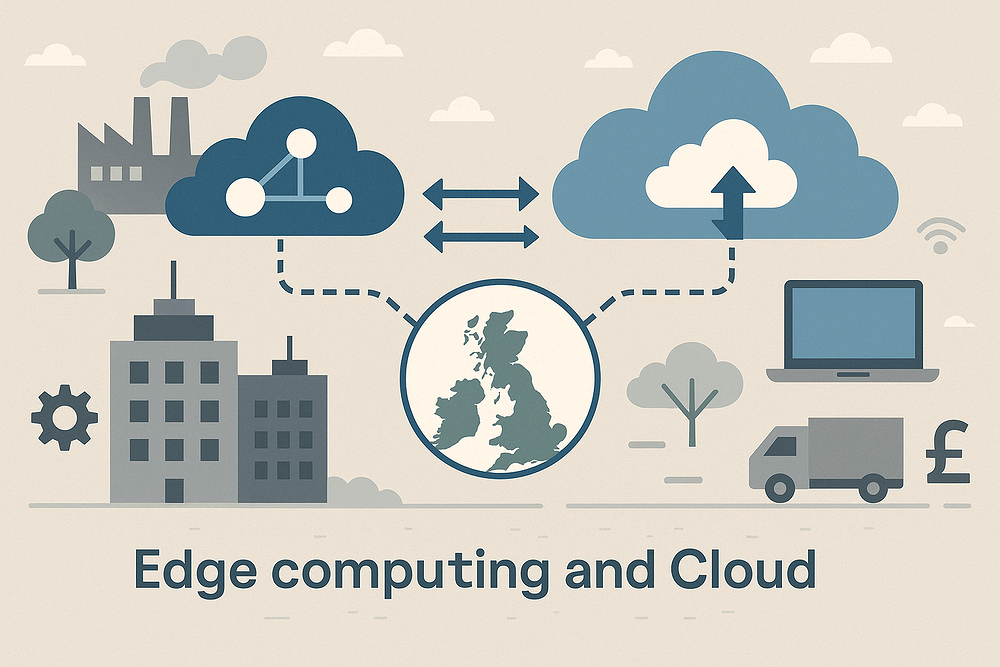Serverless Computing: Transforming Business Operations for UK Companies

Serverless Computing: Transforming Business Operations for UK Companies
In the rapidly evolving technological landscape of 2025, UK businesses are increasingly turning to serverless computing to streamline operations, reduce costs, and accelerate innovation. At AppCoder, we've witnessed first-hand how this transformative approach is reshaping how companies deploy and manage their applications. This comprehensive guide explores how serverless computing works, its benefits for UK businesses, and practical steps to implement this technology in your organisation.
What Is Serverless Computing?
Despite its name, serverless computing doesn't actually eliminate servers. Rather, it abstracts the server management layer away from developers and business owners. With serverless architecture, you no longer need to provision, scale, or maintain servers to run your applications. Instead, cloud providers automatically manage the infrastructure, allowing your team to focus solely on writing code and delivering value.
The "pay-as-you-go" model means you're only charged for the exact computing resources you use, down to the millisecond. This represents a significant shift from traditional cloud computing models where you might pay for idle server capacity.
The Business Case for Serverless in 2025
As we move through 2025, several factors make serverless computing particularly attractive for UK businesses:
Economic Efficiency in Uncertain Times
With the UK economy still navigating post-pandemic adjustments and recent trade relationship changes, cost optimisation remains crucial. Serverless computing eliminates the capital expenditure associated with hardware purchases and reduces operational costs by removing server management responsibilities. Our clients typically report 20-30% cost savings compared to traditional cloud deployments.
Sustainability Commitments
As the UK progresses toward its 2030 emissions targets, businesses face increasing pressure to reduce their carbon footprint. Serverless architectures contribute to sustainability goals by optimising resource utilisation—servers aren't running when your functions aren't executing, reducing energy consumption and associated emissions.
Talent Shortages
The technical skills gap continues to challenge UK businesses. Serverless computing reduces the need for specialised infrastructure expertise, allowing companies to make better use of their existing development talent without extensive retraining in server management.
Key Benefits of Serverless Computing for UK Businesses
Cost Optimisation
Traditional cloud services often require you to predict your computing needs and pay for allocated resources regardless of actual usage. Serverless computing implements a true consumption-based model:
- No charges when your code isn't running
- Automatic scaling during peak periods without manual intervention
- Elimination of over-provisioning costs
- No infrastructure management expenses
For a medium-sized UK business, this can translate to savings of thousands of pounds annually, particularly for applications with variable workloads.
Accelerated Development Cycles
In today's competitive landscape, speed to market can determine success or failure. Serverless architectures enable:
- Faster deployment of new features
- Reduced operational overhead
- Simplified testing and deployment pipelines
- Focus on business logic rather than infrastructure concerns
Our clients have reported development cycle reductions of up to 40% after adopting serverless approaches, allowing them to respond more quickly to market changes and customer needs.
Enhanced Scalability
The UK's unpredictable weather isn't the only thing that can change rapidly—business demands fluctuate too. Serverless computing provides:
- Automatic scaling to handle traffic spikes (like during major shopping events or marketing campaigns)
- Consistent performance regardless of user load
- Resilience against unexpected demand surges
This elastic scalability means businesses can confidently plan promotions or launch new services without worrying about infrastructure limitations.
Real-World Applications in the UK Market
Retail and E-commerce
With the continued growth of online shopping in 2025, UK retailers are using serverless computing to handle seasonal peaks without maintaining excess capacity year-round. Functions like product recommendations, inventory updates, and order processing can be efficiently managed through serverless architectures, ensuring smooth customer experiences even during events like Black Friday or summer sales.
Financial Services
The UK's financial sector, particularly in London's fintech hub, has embraced serverless computing for tasks like transaction processing, fraud detection, and regulatory compliance reporting. These workloads often have variable demands and benefit significantly from the scalability and cost-efficiency of serverless models.
Public Sector
Government agencies and public services are increasingly adopting serverless architectures to modernise their digital offerings while managing budget constraints. From council services to healthcare applications, serverless computing provides the flexibility and cost control needed for public sector innovation.
Common Concerns and How to Address Them
Security Considerations
Security remains a top priority for UK businesses, especially with the evolving regulatory landscape post-GDPR. Serverless computing actually offers several security advantages:
- Reduced attack surface with no server management layer
- Automatic security patching by cloud providers
- Simplified compliance through shared responsibility models
However, application-level security remains your responsibility. AppCoder can help implement secure coding practices and proper access controls for your serverless applications.
Vendor Lock-in
Concerns about dependency on specific cloud providers are valid. To mitigate this risk:
- Consider multi-cloud serverless strategies
- Use abstraction layers and frameworks that support multiple providers
- Implement well-defined interfaces between components
Our team specialises in designing portable serverless architectures that avoid excessive provider dependency.
Cold Starts and Performance
One technical challenge with serverless computing is "cold starts"—the delay when initialising a function that hasn't been used recently. While this has improved significantly by 2025, it remains a consideration for latency-sensitive applications. Strategies like provisioned concurrency and optimised deployment packages can minimise these effects.
Getting Started with Serverless: A Practical Approach
For UK businesses considering serverless adoption, we recommend a phased approach:
1. Identify Suitable Workloads
Not all applications benefit equally from serverless architecture. Start with:
- Event-driven processes (e.g., file processing, notifications)
- APIs with variable traffic patterns
- Batch processing jobs
- Background tasks and automation
2. Choose the Right Provider
Major cloud providers offer robust serverless platforms with UK-based data centres to address data residency requirements:
- AWS Lambda with UK regions
- Microsoft Azure Functions
- Google Cloud Functions
Each offers different pricing models and integration capabilities that may better suit your specific business needs.
3. Start Small and Iterate
Begin with a pilot project rather than attempting to migrate everything at once. This approach allows your team to build expertise and confidence with serverless technologies while demonstrating business value.
The Future of Serverless in the UK
As we move through 2025, several trends are shaping the serverless landscape:
- Integration with edge computing for reduced latency
- Enhanced AI and machine learning capabilities within serverless environments
- Improved development tools and debugging experiences
- Greater standardisation across providers
These advancements will further enhance the business case for serverless adoption, particularly for UK companies looking to maintain competitive advantage while optimising operational costs.
Conclusion
Serverless computing represents a significant opportunity for UK businesses to modernise their operations, reduce costs, and accelerate innovation. As we navigate the technological landscape of 2025, the companies that embrace these architectural approaches position themselves for greater agility and efficiency.
At AppCoder, we specialise in helping UK businesses implement serverless solutions tailored to their specific needs. Whether you're taking your first steps into serverless computing or looking to optimise existing implementations, our team of experts can guide you through the process.
Contact us today to discuss how serverless computing can transform your business operations and help you achieve your technology goals in 2025 and beyond.
Talk to us about your next project
Our team of experts is ready to help bring your ideas to life with solutions tailored to your business.
Get in Touch

